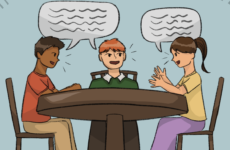I trudged my heavy feet up the stairs of the conservatory hall. Although it was extremely hot, my hands were freezing, my body was shivering. My heart felt uneasy as I sat down in front of the massive concert piano and looked to the panel of seemingly unfriendly teachers. They gave me the signal to start my piece.
As any nervous pianist does, I told myself everything was fine; it was five minutes of my life that I probably would not remember past this performance. I forced a smile on my face, then started to play. Instead of the smooth melody I associated with the Haydn sonata, I had no clue what I was playing, and I could feel my face beginning to turn the most violent shade of red. I hadn’t forgotten my piece, per se; it started with a cacophonous chord, then I found myself playing the piece completely wrong. At that point, I recognized there was no point exacerbating my embarrassment, so I stepped off the stage and the stunned teachers handed my book back to me. I nodded my head while trying to evade their questioning eyes. I hid backstage, a small but empty room filled with string instruments.
If you are a pianist older than five, it is no joke to forget your piece. It becomes a nightmare that you can only pray does not befall you. Luckily, this nightmare rarely happens. Really, it wasn’t that it happened, but that it happened at an exotic music festival in Spain where a new teacher brought me as her only student.
This was 2017. I can not describe the desolation I felt. I was sure that I would have to quit piano and head back home, never to bring up this incident again. Yet, I couldn’t leave without facing my dear piano teacher. I thought it was all said and done: I would have to explain to her my terrible mistake and she would start — and never stop — yelling at me.
The next time I saw my piano teacher, I tried to hide behind a column because I could not bear the shame. She saw me, and smiled widely. “Would you like to turn pages for me at the concert tonight?” she said casually. I turned my back to see if she was addressing someone else. “Me?” I asked sheepishly.
That night, at her chamber concert, I turned pages for her, and we discussed nothing more. We did not have another exchange until our next lesson three days later. Throughout that lesson, I waited for her to explain to me what a failure I was and how it was utterly unacceptable to do this kind of thing at my age and skill level. Instead, she said to me, “Oh, honey, Efrem told me what happened. Don’t worry, it happens to the best of us.” Just like that, the topic fell away.
Eventually, I learned to forgive myself and to forget about the experience. The students who watched the episode did as well. I got to know them, and they understood that I was overcome with nervousness and got unlucky. Even in this camp of twenty gifted kids, people didn’t hold things against me. The hardest part is forgiving yourself. With the support of my piano teacher and peers, I surprisingly managed to recover from the experience pretty quickly.
Yet, the ultimate test for me was the final chamber concert: my last chance to redeem myself. I was scheduled to perform on the same stage where I had previously choked. Surprisingly, I didn’t feel nervous. My failure could not have been worse than before, so I felt that I could only redeem myself. For the first time in my life, I was excited. I was thrilled by the prospect of performing beautiful music and pleasing a crowd. My passion and excitement resonated with my piece, and my performance was exactly as I dreamed it would be. The highlight of the performance was when my piano teacher told me afterward, “The teachers said you are really talented. They didn’t think that before.”
The only way to move past your mistakes is to forgive and forget. Through this experience, I learned even if a situation seems too daunting to move past, it’s still worth a try.



